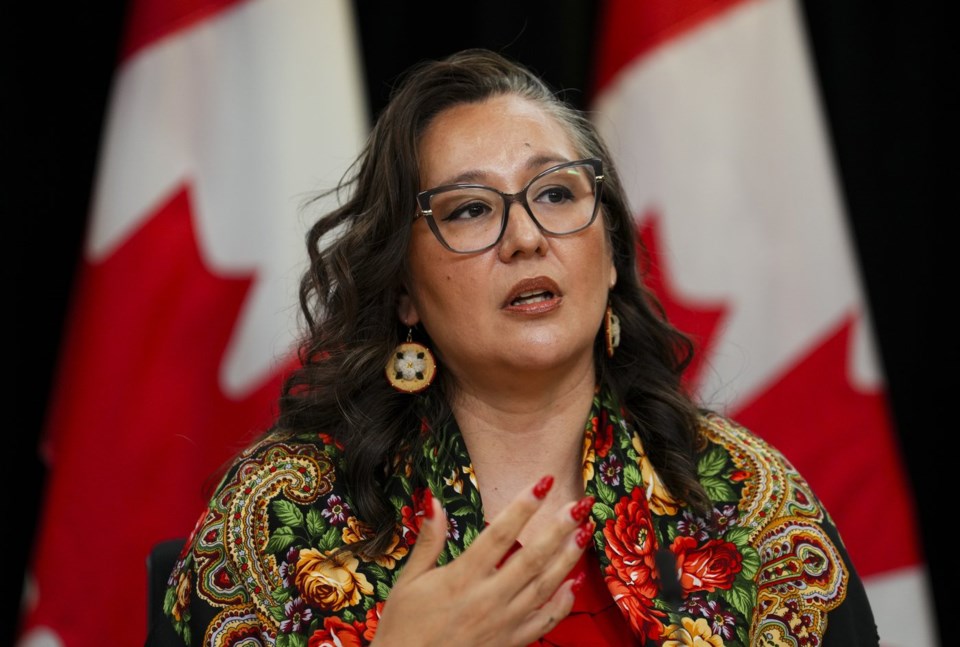OTTAWA — The national chief of the Assembly of First Nations slammed the committee of MPs studying the government's major projects bill on Tuesday for failing to invite more witnesses.
Bill C-5 would allow the federal government to override certain laws — including the Indian Act and the Species at Risk Act — to get major projects approved faster. It is being fast-tracked through the House of Commons this week, as Prime Minister Mark Carney seeks to make good on an election promise to spur nation-building projects.
Only two days were set aside for committee hearings on the bill, with extremely limited time for interested witnesses to be heard on the record about it.
First Nations leaders said the only leader invited to share their thoughts was Cindy Woodhouse Nepinak, the national chief of the Assembly of First Nations.
Woodhouse Nepinak's office told The Canadian Press Tuesday evening that she had to lobby for a spot in the committee, and that MPs granted her request at the "last minute."
She told MPs the dozens of chiefs gathered behind her in the committee room want their voices to be heard.
"We want to speak to each and every one of you," she said.
"Deep consultation involves a two-way exchange of information sharing accompanied by substantive dialogue. It is more than merely inviting First Nations rights-holders to speak for five minutes or to make written submissions from a distance. Consultation is not the Crown simply listening and going away and deciding on its own, without dialogue, without a back-and-forth on its content and scope of First Nations rights and corresponding Crown obligations under the Constitution, treaty or international law."
Ontario Regional Chief Abram Benedict told reporters chiefs in that province were similarly excluded from expressing their concerns about Bill 5 in the Ontario legislature. That bill allows Ontario to designate areas of the province as special economic zones where projects can be approved without complying with provincial laws or regulations.
"At least we got to go there and say what we needed to say in seven minutes," he said, adding it's "unacceptable" they were not even afforded that time federally.
"Canadians should be worried about it. This legislation gives the ability to do what they want, wherever they want... It's ludicrous."
In a protest on Parliament Hill earlier Tuesday, First Nations leaders urged the federal government not to pass the bill at all.
"Let me be clear — weaponizing the economy to suppress First Nations rights is economic terrorism," Chief Shelly Moore-Frappier of Temagami First Nation said to a crowd of supporters brandishing signs urging the federal government to scrap the legislation.
"It is coercion, plain and simple, and it has no place in a country that claims to value justice or honour of the Crown."
Indigenous leaders have warned the government may find itself in court if their rights are not respected and say widespread blockades and protests are not off the table.
Nishnawbe Aski Nation Grand Chief Alvin Fiddler said that if the legislation does pass, Canada is in for a "long, hot summer."
"We will not sit idly by and watch any government, whether it's Ontario or Canada, to come into our territory and take whatever they want," he said.
"Because it's ours, and your laws, your regulations, will not apply on our land."
Indigenous Services Minister Mandy Gull-Masty said in an interview Tuesday that she has asked Carney to screen new federal bills and other policies for their impacts on Indigenous communities.
She said other ministries — including labour, justice, industry and natural resources — touch on Indigenous rights in different ways and the legislation and policies they introduce should be analyzed through an Indigenous lens.
Asked whether the federal government could have avoided conflict if it had undertaken an Indigenous-based analysis of C-5 before it was introduced, Gull-Masty said she "would hope so."
"I often ask myself when these kinds of things happen, 'Where was the point that communication could have been enhanced on both sides?'" she said.
"I hear what's going on in the community. I hear all kinds of responses. But getting to the table and clarifying what it is you expect, or what you understand this bill to be, or what your concerns are, that's where the real problem-solving is."
Gull-Masty said that as a former grand chief, she knows economic participation is not the bottom line for Indigenous communities worried about the impacts of development on their culture and the environment.
She said Carney is "super open" to the idea of reviewing bills and policies through an Indigenous lens and is willing to engage new methods brought forward by cabinet's Indigenous caucus.
The federal government already has a duty to consult with Indigenous Peoples when legislation could affect their lands or rights.
The United Nations Declaration on the Rights of Indigenous Peoples, which Canada adopted, also requires free, prior and informed consent — though the federal government says that does not amount to an Indigenous "veto" on projects.
Gull-Masty's pitch for Indigenous analysis of new legislation would be based on Ottawa's "gender-based analysis plus" — a 30-year-old mechanism which the government says "has become an integrated component" of its decision-making process.
Fiddler said it's "so backwards" for that lens to be applied after the introduction of C-5, and that the government should have spoken with First Nations before they even drafted the bill.
This report by The Canadian Press was first published June 17, 2025.
Alessia Passafiume, The Canadian Press




